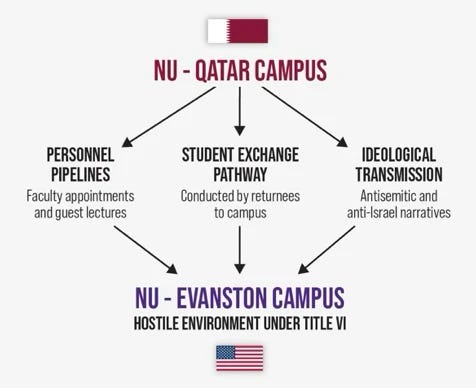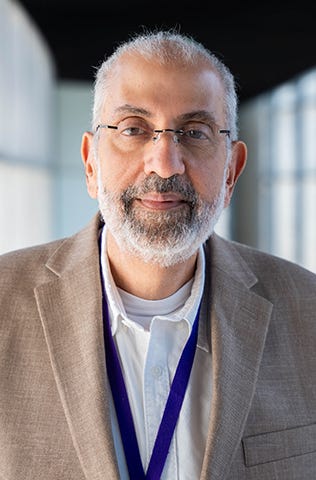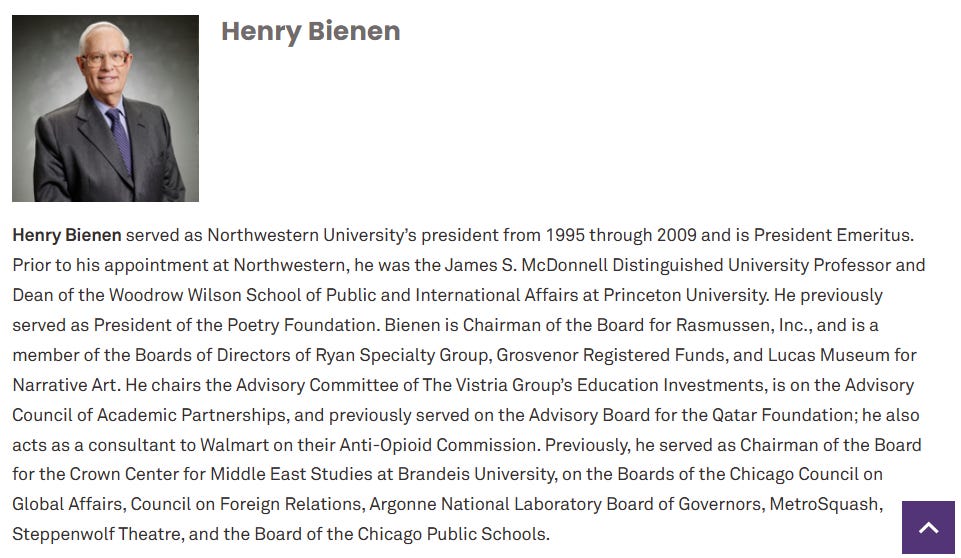New Report Reveals How Qatari Money Compromised Northwestern University
The report by the Middle East Forum delves into Northwestern's troubling financial ties to Qatar and employment of Hamas-linked faculty, amidst university president's resignation and legal scrutiny
A comprehensive new report released by the Washington D.C.-based Middle East Forum has unveiled troubling details about Northwestern University's financial ties to Qatar and its employment of faculty members with documented connections to Hamas. The findings emerge as the embattled institution faces intensifying federal scrutiny, with President Michael Schill recently announcing his departure amid ongoing investigations.
Yet in an ironic twist, the university has appointed Henry S. Biene — who is both the original architect of the controversial Qatar partnership and currently sits on the advisory board of the Qatari Foundation — as interim president to replace Schill.
Presidential Resignation Follows Congressional Hearing Revelations
The timing of the report's release is striking, coming just days after Northwestern President Michael Schill announced his resignation following a disastrous congressional hearing that exposed the university's troubling relationship with Qatar. House Committee testimony revealed that Northwestern's contract with the Qatar Foundation includes clauses that effectively prohibit students and faculty from criticizing the Qatari regime, the Washington Free Beacon reported on September 5th.
During his August testimony with House Education and Workforce Committee staffers, Schill disclosed that Qatar has provided Northwestern with $737 million since the university opened its Doha campus in 2008. The contract stipulates that all Northwestern personnel "shall be subject to the applicable laws and regulations of the State of Qatar, and shall respect the cultural, religious and social customs of the State of Qatar," restrictions that extend to Northwestern's main Illinois campus.
The report also documents how Qatar's massive investment has facilitated what researchers describe as a "bilateral academic, financial, and ideological integration" between the campuses. Faculty members with dual appointments regularly transport anti-Israel narratives between Doha and Evanston, contributing to the hostile environment for Jewish students that prompted federal Title VI investigations.

Extremist Professors Teaching American Students
The extensive investigation exposes Northwestern's employment of Ibrahim Abusharif, a professor whose background includes co-founding an organization that federal courts determined was responsible for funneling more than $1 million to Hamas. Currently, Abusharif leads a required "Doha Seminar" for American exchange students at Northwestern's Qatar campus, a position he has held for 17 years.
His appointment came after his previous organization, the Quranic Literacy Institute, was shuttered following a landmark $156 million terrorism financing judgment against the group.Professor Khaled Al-Hroub, who holds positions at both campuses, exemplifies this concerning pattern. Just days after Hamas's October 7 massacre, Al-Hroub called for a "third intifada" and urged Muslims to "bring America to its knees through an economic boycott."

The Middle East Forum report also highlights Northwestern's hiring of Mkhaimar Abusada as a visiting associate professor of political science, a position secured as part of the university's controversial deal with anti-Israel student protesters in spring 2024. Abusada serves on the boards of two organizations—the Independent Commission for Human Rights and Palestinian Center for Human Rights—that present themselves as human rights groups but maintain documented ties to Hamas and Popular Front for the Liberation of Palestine terrorists.

Notably, Abusada wrote about meeting late Hamas leader Yahya Sinwar in 2018, and the State Department sanctioned the Palestinian Center for Human Rights in September 2024. Despite President Michael Schill admitting he was unaware of these affiliations during the hiring process, Northwestern extended Abusada's appointment through August 2026, with Schill defending the decision by suggesting that professors studying Gaza politics inevitably encounter such figures in their research.
Northwestern’s New Interim President: The Original Architect of NU-Q
In a new development that underscores the deep institutional roots of these controversies, Northwestern has appointed Henry S. Bienen—the original architect of the Qatar partnership—as interim president to replace Schill.
Bienen, who served as Northwestern's president from 1995 to 2009, was approached by the Qatar Foundation in early 2006 and became the driving force behind the controversial partnership. Significantly, Bienen also previously served on the advisory board of the Qatar Foundation itself, creating a direct institutional conflict of interest as he assumes leadership of Northwestern during this crisis.

Bienen was remarkably candid about the financial motivations driving the Qatar partnership. "I was getting a lot of email—there was a boom in the Gulf," he told the student publication North by Northwestern in 2008. He assured the Daily Northwestern in 2007 that there were "no negatives for the university financially," as "whatever costs the university will incur will be reimbursed—plus." The Qatar Foundation ultimately provided more than half a billion dollars to Northwestern between 2007 and 2024, far exceeding even Bienen's optimistic projections.
Bienen's enthusiasm for the Qatar partnership extended beyond financial considerations. He specifically cited Al Jazeera as a key attraction, stating in 2008: "If we can help bearing a set of standards so it's not just a political rat race... I thought there was an advantage of doing that in the home of Al Jazeera. That's why they wanted to come to what they heard was the best journalism school in the country." The Washington Free Beacon
Northwestern's Qatar campus maintained a "partnership with Al Jazeera Media Network" that enabled students to "engage regularly with media industry professionals." Much like the Qatari government, which has sheltered scores of terrorist leaders, Al Jazeera has close ties to terror, with several of its journalists being members of Hamas and the Palestinian Islamic Jihad. Schill only severed this relationship after being pressed about it by lawmakers last year in 2024.
Florida Officials Demand End to Northwestern Partnerships
The controversies surrounding Northwestern have now spread beyond campus boundaries. Top elected officials in Florida, including Agriculture Commissioner Wilton Simpson, Attorney General James Uthmeier, and Chief Financial Officer Blaise Ingoglia, have demanded that BayCare Health System either end its new partnership with Northwestern or provide full documentation that no state funding is involved.
"Northwestern, by contrast, has no such accountability, and has been the subject of serious controversies that raise questions about its suitability as a partner for an entity receiving Florida taxpayer dollars," the officials wrote, citing the university's ongoing federal investigations for alleged Title VI violations and failure to protect Jewish students.
BayCare responded that it "is fully compliant with all Florida laws, and no state funding—directly or indirectly—is provided to Northwestern University," while promising to share more information with elected leaders to confirm compliance.




During my tenure at Northwestern University’s museum, I observed a pronounced institutional and cultural connection to Qatar. Across the Evanston campus, Middle Eastern influences were highly visible. Student gathering spaces routinely displayed Al Jazeera English on television throughout the day, and campus publications frequently highlighted study opportunities in Qatar.
The student organization Students for Justice in Palestine (SJP) maintained a strong presence, often confronting Jewish and Christian students who voiced support for Israel. Attempts at respectful dialogue by Jewish or Christian students were frequently met with hostility from SJP members, limiting the possibility of balanced discourse.
One illustrative incident involved the university’s non-denominational meditation and reflection room, intended as a multi-faith space. Over time, the room—approximately twelve feet square—was effectively transformed into a Muslim prayer area. Prayer rugs were installed, ritual washing facilities were added, and any Bibles placed on the communal table were consistently replaced with copies of the Qur’an.
Campus programming further reflected this imbalance: invited speakers who advocated for the Palestinian cause were given platforms without comparable opportunities for opposing viewpoints. Collectively, these experiences suggested a campus climate in which expressions of support for Israel or alternative religious perspectives were marginalized.
What about the millions Netanyahu sent to Hamas through Qatar?